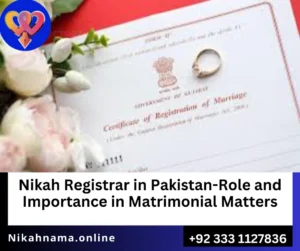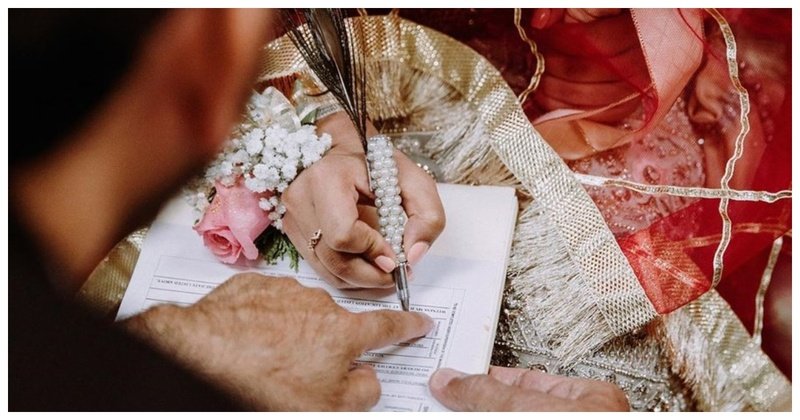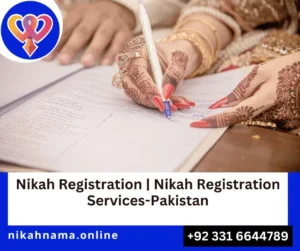
Nikah Nama: A Social and Legal Marriage Contract in Pakistan
Nikah Nama is a Social and Legal Marriage Contract in Pakistan
Nikah Nama is a social as well as a legal contract and it contains the detail and the terms and conditions of the Nikah (marriage) contract. Information about the parties to the marriage, the amount of dower, the conditions of the Nikah established between them, and the names and addresses of witnesses are all recorded there. Registration serves as proof of marriage, and being a public document, it can be used as evidence in court in case of a marriage dispute.
Nikah Nama clearly represents the facts and conditions agreed between the parties.
Nikah Nama clearly represents the facts and conditions agreed between the parties in its columns, which are distinguished by numerical numbers.
Nikah Nama should be filled out in the manner and with the care that it deserves. If there is a dispute, it will be important that the facts recorded can be understood clearly and there will not be any ambiguities if the facts are recorded.

A violation of this will result in a fine of Rs. 25,000 and also imprisonment
In the Nikah Nama, columns are provided for storing specific information along with settlements between the parties regarding dower, documents made relating to maintenance or dower, the delegation of the husband’s right to talaq to his wife, or restriction of the husband’s right to talaq. Other special conditions agreed upon between the parties can also be recorded in another column.
Marriages may not use all columns in the Nikah Nama
A marriage may not be able to use all of the columns in the Nikah Nama depending on the circumstances which surround it. In every marriage, there will obviously be some columns that must be filled in. As for the rest, they are as follows:
If they apply to the marriage in question, they should be filled out. These columns begin with the words ‘if’ or ‘whether’ and they should be filled in whenever there is some kind of information to be provided in relation to the particular column. Column 7 asks, for example, whether the bride has appointed any representative (word vakeel means lawyer in Urdu, but here it is used to mean representative) for herself. In the event that she has appointed one, the column should only be filled in, and it is not mandatory for the bride to do so.
The Nikah Nama Conditions
There must be an agreement between the parties before the Nikah or during the Nikah as to the conditions for recording in the Nikah Nama. As a general rule, any conditions can be revised with mutual consent between the parties, but it is best to record these in writing in the form of acknowledgments or agreements depending on the nature of the condition or settlement and to have them registered separately with the Registrar appointed under the Registration Act of 1908.
In the event of any violations, the registrar may be jailed for one month and fined 25000 rupees.
Nikah Nama columns can be categorized into three types.
Generally, Nikah Nama columns can be categorized into three types.
Factual information about both parties is required for the first category of columns. The Nikah Khwan/Registrar must ensure that the names of the concerned parties along with their dates of birth are the same as on their ID cards and/or B Form. If the current address is different from the permanent address both can be mentioned. If documentation is not checked and the marriage is found to be an underage marriage then liability will be incurred by the parties under the Child Marriage Restraint Act.
A vakeel or representative is usually appointed to Represent the Bride
A vakeel or representative is usually appointed based on the bride’s marital status but there is no requirement that the bride appoints someone as a vakeel. There must be a clear mention that she has not appointed anyone as her representative if no representative has been appointed. It is important to fill in the next two columns carefully requesting the names of the two witnesses to the appointment of the bride’s representative, as well as their relationship with the bride. Columns like those should clearly indicate that they don’t apply. If there is any relation between the witnesses and the bride’s representative, it must be stated. Witnesses do not need to be related to the bride, but the relationship between them and the representative needs to be stated. There cannot be the same witnesses in both cases.
If witnesses are to be appointed as vakeel as well as witnesses for the marriage, the registrar must ensure that they are not the same.
In addition to the columns in this category, if the groom is a widower or a divorcee, or if he has a child/children, their names and ages must be recorded as well. After obtaining the permission certificate from the relevant authorities, the groom may contract another marriage
If the groom has an earlier wife/wives and the certificate is issued by the Arbitration Council, the reference number and date of the letter will also need to be recorded. In the event that the Nikah Registrar discovers later that the groom is contracting a second marriage without obtaining permission from the Arbitration Council, he cannot be held responsible.
Nikah Namas provide columns pertaining to the husband’s status (widower or divorcee) and whether there are any children,
The third column is devoted to the marriage’s conditions and settlements.
In order to move on to the actual columns and what the inquirers are asking, it should be mentioned that it is not permissible for the parties to decide on a condition that is contrary to the spirit of the Nikah. It would be impossible for a party to legally agree to such a condition, even if the parties were to agree to it.
Conditions in the Nikah Nama, that are in opposition to the law and public policy cannot be entered.

Any legal right belonging to either party should be unaffected by the marriage.
Any legal right belonging to either party should be unaffected by the marriage. It is possible to curtail or impose conditions on a right but not to terminate it. An example of this would be the clause in the Nikah Nama which specifies that the wife cannot petition a Court for a Khula, which could be a condition in the Nikah Nama. Even if this condition is agreed upon, it is illegal, and it cannot be enforced legally, even if it is agreed upon. It will also be struck down if the contract between the parties states that the mother will not be responsible for her children’s maintenance because she is legally obligated to provide for them.
Nikah Nama conditions should be carefully drafted.
Nikah Nama conditions should be carefully drafted so as not to terminate a lawful right. To determine whether a lawful right is being surrendered, one must first determine if the right is valid and, second, whether the subject is aware of the consequences.
When performed correctly, the Nikah is considered valid. There is no invalidation of the Nikah Nama if it contains a void condition.


